|
|
|
Sort Order |
|
|
|
Items / Page
|
|
|
|
|
|
|
| Srl | Item |
| 1 |
ID:
113824
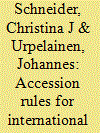

|
|
|
|
|
| Publication |
2012.
|
| Summary/Abstract |
Powerful states often accept unanimity voting on accession to international institutions, even though this enables weak states to blackmail powerful states into providing costly side payments. Whereas the literature attributes this choice mainly to efforts to bolster the legitimacy of international institutions, the authors demonstrate that the choice of unanimity also has a strategic component. The authors formally show that unanimous accession rules can profit powerful states by creating uncertainty as to the minimal level of reform that enables accession. If accession is valuable enough and the membership candidate is uncertain about the resolve of weak states, it plays safe by implementing ambitious reforms that improve the efficacy of the international institution. In this case, a legitimacy-efficacy trade-off does not exist: the unanimity rule enhances legitimacy while allowing powerful states to induce significant reforms by applicants to the benefit of current members.
|
|
|
|
|
|
|
|
|
|
|
|
|
|
|
|
| 2 |
ID:
113823
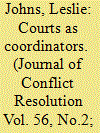

|
|
|
|
|
| Publication |
2012.
|
| Summary/Abstract |
Why do states build international courts, submit cases, and enforce court judgments? This article examines the role of a court that is neither a "decider" nor an "information provider." Litigation is costly and does not reveal private information. The court's ruling is not binding and bargaining can occur before and after the court has ruled. Nevertheless, an alternative dispute resolution mechanism emerges: court rulings can coordinate endogenous multilateral enforcement. Disinterested states will enforce to ensure that they can profitably use the court in the future. Accepting jurisdiction of the court allows a state to make efficiency-enhancing "trades," winning high-value disputes in exchange for losing low-value disputes. This is possible because litigation is a screening device: states only sue when they derive relatively high value from the disputed asset. The use of the court as a coordination device for multilateral enforcement allows for the existence of a court with endogenous enforcement and jurisdiction.
|
|
|
|
|
|
|
|
|
|
|
|
|
|
|
|
| 3 |
ID:
113820
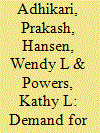

|
|
|
|
|
| Publication |
2012.
|
| Summary/Abstract |
In analyzing peace processes in postconflict societies, scholars have primarily focused on the impact of prosecutions, truth-telling efforts, and reconciliation strategies, while overlooking the importance of individual demands for reparations. The authors argue that normative explanations of why reparations are granted in the aftermath of regime change are useful in understanding a need for reconciliation, but inadequate for explaining victim demands for compensation. The authors extend this research to study civil war settlement. In the aftermath of civil war, when some form of reparation is offered giving individuals the opportunity to seek redress of grievances, what types of loss and political and socioeconomic characteristics are likely to lead some individuals to apply for reparations but not others? Using primary data, collected through a public opinion survey in Nepal, the authors investigate individual-level demand for reparations. The findings suggest that understanding loss and risk factors may be important to civil war settlement and reconciliation.
|
|
|
|
|
|
|
|
|
|
|
|
|
|
|
|
| 4 |
ID:
113819
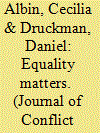

|
|
|
|
|
| Publication |
2012.
|
| Summary/Abstract |
This article explores relationships between procedural justice (PJ) in the negotiation process, distributive justice (DJ) in the terms of negotiated agreements, and their durability in cases of civil war. Adherence to PJ principles was found to correlate strongly with agreements based specifically on the DJ principle of equality. Agreements were also found to be more durable when based on equality, but not when based on other DJ principles. The equality principle accounted for the relationship between PJ and durability irrespective of differences between the parties in power. Further examination suggested that two types of equality in particular-equal treatment and equal shares-were associated with forward-looking agreements and high durability. The findings suggest that durability is served by including equality in the terms of agreements, and that PJ helps (but does not guarantee) achieving such agreements.
|
|
|
|
|
|
|
|
|
|
|
|
|
|
|
|
| 5 |
ID:
113826
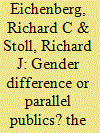

|
|
|
|
|
| Publication |
2012.
|
| Summary/Abstract |
Gender is now recognized as an important dividing line in American political life, and scholars have accumulated evidence that national security issues are an important reason for gender differences in policy preferences. We therefore expect that the dynamics of support for defense spending among men and women will differ. In contrast, several scholars have shown that population subgroups exhibit a "parallel" dynamic in which the evolution of their preferences over time is very similar, despite differences in the average level of support. Unfortunately, there is little time series evidence on gendered reactions to policy, including defense spending, that would allow one to arbitrate between these competing perspectives. In this research note, we assemble a time series of support for defense spending among men and women and model the determinants of that support for the period 1967-2007. We find that women are on average less supportive of defense spending than are men. However, we also find that the over time variation of support for defense spending among men and women is very similar-each is conditioned principally by the past year's change in defense spending and occasionally by war casualties and a trade-off between defense and civilian spending.
|
|
|
|
|
|
|
|
|
|
|
|
|
|
|
|
| 6 |
ID:
113821
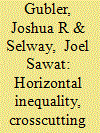

|
|
|
|
|
| Publication |
2012.
|
| Summary/Abstract |
In this article, the authors bring together research on horizontal inequality, geographic dispersion of ethnic groups and crosscutting cleavages to present a more holistic theory of ethnic structure and civil war onset. The authors argue that rebel leaders are thwarted in their mobilization efforts in highly crosscutting societies due to a lower probability of potential combatants identifying with nationalist goals, decreased ability to exert social control, and diminished in-group communication. Using cross-national data from over 100 countries, the authors provide evidence that civil war onset is an average of nearly twelve times less probable in societies where ethnicity is crosscut by socioeconomic class, geographic region, and religion.
|
|
|
|
|
|
|
|
|
|
|
|
|
|
|
|
| 7 |
ID:
113822


|
|
|
|
|
| Publication |
2012.
|
| Summary/Abstract |
Given the myriad of human rights abuses that occur globally and daily, why are some nations on the receiving end of a substantial amount of international opprobrium, while others receive far less attention and condemnation? The authors contend that the increasing presence of human rights organizations in such states is the critical link between the local and the international. Increases in the number of such groups contributes significantly to the generation of Amnesty International urgent actions, one of the most-often-utilized tools in naming and shaming campaigns against human rights abusing regimes. The authors find strong support for nearly all their hypotheses.
|
|
|
|
|
|
|
|
|
|
|
|
|
|
|
|
| 8 |
ID:
113825
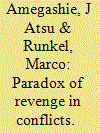

|
|
|
|
|
| Publication |
2012.
|
| Summary/Abstract |
The authors consider a two-period game of conflict between two factions, which have a desire for revenge. It is shown that, in contrast to conventional wisdom, the desire for revenge need not lead to escalation of the conflict. The subgame-perfect equilibrium is characterized by two effects: a value of revenge effect (i.e., the benefit of exacting revenge) and a self-deterrence effect (i.e., the fear of an opponent's desire to exact revenge). The authors construct examples where the equilibrium is such that the self-deterrence effect paradoxically outweighs the value effect and thereby decreases the factions' aggregate effort below the level exerted in the no-revenge case. This paradox of revenge is more likely, the more elastically the benefit of revenge reacts to the destruction suffered in the past and the more asymmetric is the conflict. The authors discuss the implications of revenge-dependent preferences for welfare economics, evolutionary stability, and their strategic value as commitment devices.
|
|
|
|
|
|
|
|
|
|
|
|
|
|
|
|
|
|
|
|
|